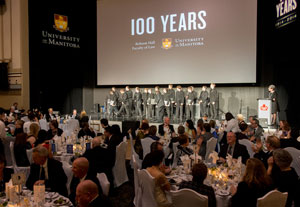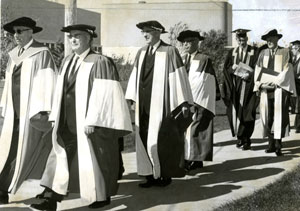This year has been a busy one for the Faculty of Law at the University of Manitoba, as 2014 marks our centennial year. Our law school, uniquely in Canada, was created as a joint venture of the University of Manitoba and the Law Society of Manitoba in 1914. Prior to that, the law society ran an apprenticeship program of articles of clerkship, just like other law societies across the country, and the university ran a “reading” program with exams in law that the law society recognized to reduce the number of years of articling.
They came together in 1914 to jointly fund, plan, and operate the Manitoba Law School. This unique start in life may have provided some foundation to bridge the perennial gap between theory and practice, academics and lawyers, or however one might characterize it, but like any other law school in Canada, it did not make us immune.
 In 2014, as we celebrate 100 years, these same tensions are present in the significant upheaval that legal education and the practice of law are experiencing. Indeed, at Robson Hall at the University of Manitoba, we embrace this opportunity for growth and innovation.
In 2014, as we celebrate 100 years, these same tensions are present in the significant upheaval that legal education and the practice of law are experiencing. Indeed, at Robson Hall at the University of Manitoba, we embrace this opportunity for growth and innovation.
Nearly 30 years ago, Brian Dickson, former chief justice of the Supreme Court of Canada and alumnus of the Manitoba Law School, offered a dinner speech at a national conference on legal education where he noted legal education should be broad and always focused on the people for whom the law exists. He urged law schools to be more inclusive of the diversity of Canadian society, and in particular that the law schools, the bench, and the bar needed to be diligent and imaginative in including indigenous communities.
He insisted law schools and the profession ought to devote a great amount of attention and energy to studying and understanding the deep social problems of our time — problems of poverty, inequality, and the environment — through an interdisciplinary focus in legal education so law students become more sensitive to the valuable contributions of philosophers, economists, historians, scientists, and social scientists.
Finally, he underlined the importance of the good legal scholarship emanating from law schools in shaping the legal principles that evolve through the legislative and judicial processes.
Dickson would likely be very pleased with how legal education in Canada has embraced many of these principles and how his alma mater is flourishing on its 100th anniversary.
As we celebrated our centennial year, we built and strengthened our connections that bring a focus to the people whom the law serves and the pressing questions of our time.
We opened the year with our One Hundred Letters Project that connected each member of our first-year class with an alumni “pen pal” to build bridges over distance and time.
Still with our focus on students, our graduating class was addressed by Supreme Court of Canada Justice Rosalie Abella, who received an honourary Doctor of Laws. Reaching out into the community, we offered conferences on topics ranging from a look at systemic discrimination in the death of Brian Sinclair, to migration law, to the impact of the Supreme Court’s decisions in Tsilhqot’in and Keewatin, to a challenging review of the ethical obligations of a lawyer whose client engages in unlawful activity on a panel that included two of Canada’s most influential lawyers for 2014, Justice Murray Sinclair (Class of 1979) and Edgar Schmidt (Class of 1982).
Of course, a centennial must have a celebration, and on Oct. 18, hundreds of alumni gathered at the recently restored Metropolitan Theatre for a gala event. It was a perfect venue for the premiere of a movie that tells our story over the past 100 years. A few students were in attendance, among them third-year Joshua Shaw.
Having just started an internship at the Court of Appeal, he found himself sitting at a table surrounded by judges. One leaned over and asked what he believed was the most important thing Robson Hall had done for him.
 No one had ever asked him before and after a weighty pause, he answered: “Robson Hall represented the first time I felt excited about my education. It challenged me, catalyzing my intellectual growth, in ways that I was not anticipating. I saw how the ideas we discussed at Robson Hall could have material impact on the world around us and how it also could improve [and totally destroy] real human lives.
No one had ever asked him before and after a weighty pause, he answered: “Robson Hall represented the first time I felt excited about my education. It challenged me, catalyzing my intellectual growth, in ways that I was not anticipating. I saw how the ideas we discussed at Robson Hall could have material impact on the world around us and how it also could improve [and totally destroy] real human lives.
“It brought a meaning to my intellectual pursuits that I had not felt before. I felt an immense sense of meaning for one of the first times in my life. I felt a sense of belonging and connection to a larger community, and a civic duty that had long eluded my thoughts. In this way, my time at Robson Hall was irreplaceable.”
Later in the evening, as he met other lawyers, judges, and professors, it became clear this was an experience shared by others, formative in their legal careers. The experiences gained during that time allowed them to serve not only the local community, but the global community as well.
For Joshua, “each of these proud alumni, exemplify the principles of Robson Hall. To be among this cohort was completely inspiring, leaving me that evening with a profound sense of belonging. What had began as a chance invitation, turned out to be a moment that re-affirmed my desire to be a lawyer. Hopefully in the next 100 years, future generations of Robson Hall students enjoy the same revelations that I have. What is clear from this evening and upon reflection of my time at Robson Hall is that the school has been integral to the lives of Manitobans and beyond, and will continue to be as it evolves for the years to come.”
While the official “anniversary” date was Oct. 6, the Faculty of Law at Robson Hall is continuing its celebrations through the 2014-15 academic year with alumni events in Calgary, Toronto, and Thompson, Man., and a wrap-up celebration in Winnipeg in the spring.
Lorna Turnbull is dean at the University of Manitoba Faculty of Law.
Note: Photos are courtesy of the University of Manitoba Faculty of Law.







